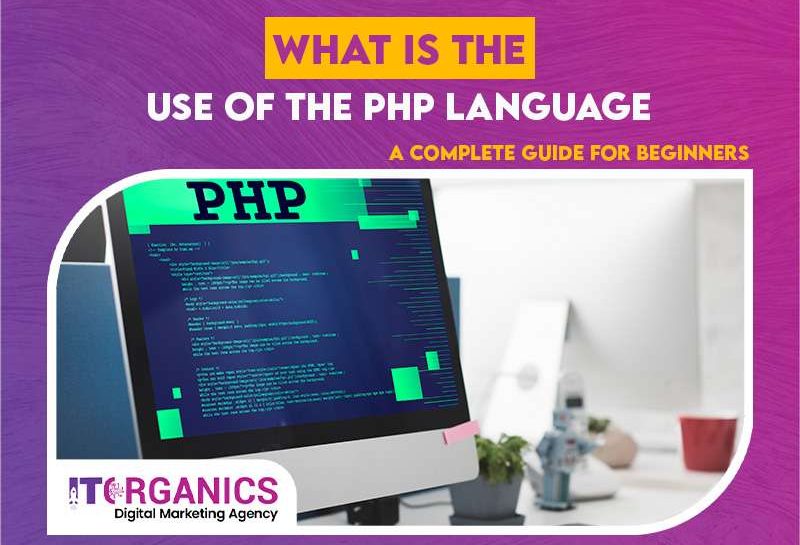
What Is the Use of the PHP Language? A Complete Guide for Beginners
Nowadays, with the digital age, websites and web applications are at the center of any business, blogging activities, e-commerce, and even learning processes. However, have you ever thought about what is going on in the scenes of your favorite sites? The PHP language is one of the powerhouses in web development.
Granted, no experience or interested in knowing what is PHP language is used for? This ultimate guide will take you through all you need to know. We are going to discuss how it is used, its features, and address some of the frequently asked questions, such as “Is PHP a programming language?” or “Is PHP a backend language?”
What Is the PHP Language?
PHP used to be named Personal Home Page; currently, the term refers to the hypertext preprocessor. The complete name of the programming language, PHP therefore is, Hypertext Preprocessor.
PHP is an object-oriented, dynamic script language specifically applicable in the composition of dynamic and interactive Internet pages.
PHP language is a scripting language that is predominantly employed in the development of dynamic and interactive web pages. It is open source, meaning that it is free for use and has a vast number of developers around the globe.
Having Googled what is PHP programming language is, the brief answer will be that most people prefer to use it as a tool in the development of server-based applications and dynamic websites.
Is PHP a Programming Language?
Yes, PHP is a programming language, more accurately, it is a scripting language. Scripting languages are streamlined and, in that regard, they are antagonistic to general-purpose programming languages such as C or Java that can be used to automate the processes of other programs. In the case of PHP, it runs on a web server such as Apache or Nginx.
When you by chance encounter the question; Is PHP a scripting language or not, then the answer is yes. It gathers data and sends it to the databases and renders it back to the user in a personalized manner in real time.
PHP Language: Key Features
Let’s explore why developers continue to use the PHP programming language even with newer technologies on the market:
- Open Source: PHP has no payment costs, but it is free to use.
- Cross-platform Compatibility: It can operate on Windows, Linux, macOS, and even the biggest servers.
- Database Integration: Database integration into MySQL, PostgreSQL, Oracle, etc. is facilitated.
- Fast Speed: PHP is fast, especially when code is run with the help of fast execution programs like caching.
- It is easy to learn, the syntax is learner-friendly, and therefore appropriate to a novice coder.
What Is PHP Language Used For?
Here’s what the PHP language is commonly used for:
-
Website Development
Major websites using PHP server-side language include WordPress, Wikipedia, and Facebook, among others (77 percent of the known total).
-
Content Management Systems (CMS)
WordPress, Joomla, and Drupal are web-based applications coded using PHP, and it is important, especially in enabling one to manage a site without any technical knowledge.
-
E-commerce Platforms
Such tools as Magento, WooCommerce, and OpenCart are developed on the basis of PHP. PHP is a good choice in case you are developing an online shop.
-
Web Applications
From submission to data storage and user authentication, PHP makes short work of user dashboards to customer portals.
-
Data Collection
PHP can collect user data through contact forms, subscription forms, and surveys.
-
Server-side Scripting
It executes scripts on the server in order to process information and provide the users with individual results.
-
API Integrations
PHP has a simple ability to connect with other APIs, and you can retrieve information from other sites or applications.
PHP Is a Backend Language
Is PHP a backend language? Yes, it is. On the server, PHP is deployed, receives requests, chats with databases, and constructs dynamic pages. PHP deals with processing all the things that happen in the background, which include taking and processing the form submission and managing the user session, and accessing the database.
PHP is an important backend programming language in the functionality of a web application or site as a whole. It provides the assurance that data is securely, efficiently, and can be provided to the user interface. A large number of well-known websites and content management systems use PHP as a backend mechanism.
Is PHP an Object-Oriented Language?
PHP was initially based on procedural programming, but currently supports object-oriented programming (OOP).
So, what we need to answer our question is, is Philippine Piss an object-oriented language then? The answer is yes.
Another aspect that makes this feature useful is that it makes PHP more similar to the current programming standards, hence it can be used in big and complex web applications.
Scripting Language in PHP: How It Works
As a scripting language, PHP is not required to be compiled as Java or C++. This speeds up and simplifies development and debugging.
PHP is not a multi-language platform per se, but it allows multi-language websites to be created using the platform. PHP can be used by developers to:
- Detect browser language preferences
- Load language-specific content
- Integrate translation files (.po or .mo)
- Manage multilingual URLs or domains
Why Choose PHP Over Other Languages?
The following are some of the reasons developers continue to use PHP instead of Python, Node.js, or Ruby:
- Universal Usage: PHP constitutes a huge section of the web.
- Great Community: Lots of documentation, forums, and third-party libraries.
- Hosting Compatibility: PHP is supported on nearly all web hosts by default.
- Scalability: Facebook and Wikipedia sites demonstrate that PHP is capable of supporting a large traffic.
A Simple PHP Programming Language Tutorial (For Beginners)
Here’s a basic PHP programming language tutorial to get you started.
- Installing PHP
- Writing Your First PHP Script
- PHP Variables and Arrays
- PHP Forms and User Input
About PHP Programming Language: A Brief History
Rasmus Lerdorf invented the PHP programming language in 1994 and used it to monitor the visits to his online resume. It eventually became a complete scripting language.
- PHP 3 (1998) – First major release that had database support.
- PHP 5 (2004) -added OOP features.
- PHP 7 (2015) – Dramatic optimization.
In modern times, PHP continues evolving and changing with every new version.
Advantages of Using the PHP Language
- Easy to learn and use
- Strong community support
- Compatible with all major databases
- Fast execution and low memory usage
Final Thoughts
In spite of the emergence of other technologies, the PHP language continues to be a good option as far as backend web development is concerned. Nothing indicates that PHP will ever fade away, because it is easy to use, has strong capabilities, and has extensive support.
PHP is the programming language that will equip you with the tools and possibilities to accomplish it, whether you are creating a blog, an online store, or a full-stack application. For website development services, reach out to us at IT Organics. We are here to assist you in creating an appealing website structure.
FAQs
Q: What is the use of the PHP language to you?
Some of the things that PHP is used to create are dynamic websites, form processing, working with databases, session management, and integrating APIs.
Q: Does PHP belong to a scripting language or a programming language?
It’s both. PHP is a web scripting language that is created to be used in web programming , but acts very much like a programming language.
Q: Does PHP have object orientation?
Yes, PHP does support object-oriented programming, which makes use of classes, objects, and inheritance.
Q: Is PHP applicable to multilingual sites?
Yes, by using user preferences, it is possible to set up PHP to handle numerous languages by providing the appropriate content.






